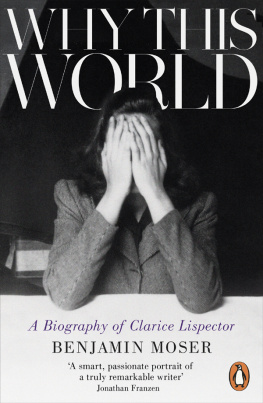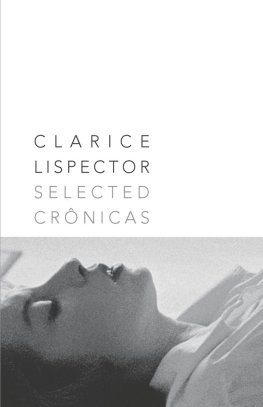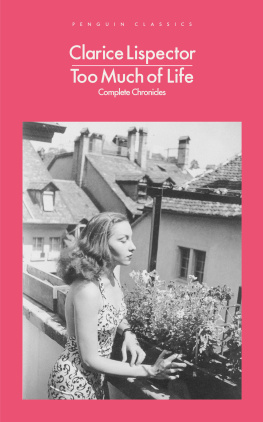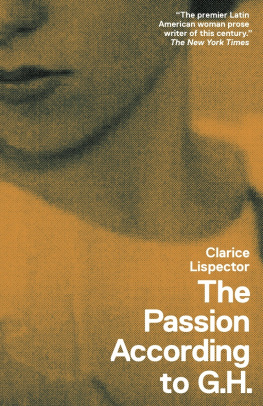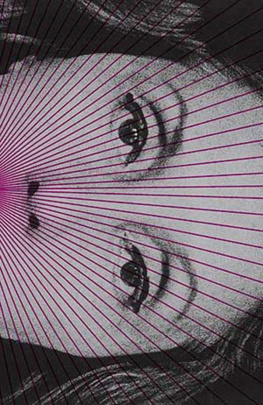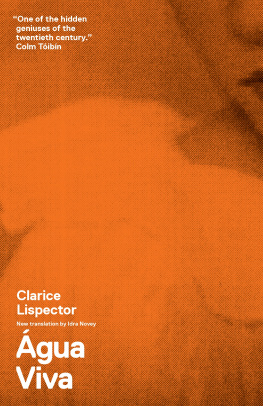Lispector Clarice - Reading with Clarice Lispector
Here you can read online Lispector Clarice - Reading with Clarice Lispector full text of the book (entire story) in english for free. Download pdf and epub, get meaning, cover and reviews about this ebook. City: Minneapolis, year: 1990, publisher: University of Minnesota Press, genre: Art. Description of the work, (preface) as well as reviews are available. Best literature library LitArk.com created for fans of good reading and offers a wide selection of genres:
Romance novel
Science fiction
Adventure
Detective
Science
History
Home and family
Prose
Art
Politics
Computer
Non-fiction
Religion
Business
Children
Humor
Choose a favorite category and find really read worthwhile books. Enjoy immersion in the world of imagination, feel the emotions of the characters or learn something new for yourself, make an fascinating discovery.

- Book:Reading with Clarice Lispector
- Author:
- Publisher:University of Minnesota Press
- Genre:
- Year:1990
- City:Minneapolis
- Rating:3 / 5
- Favourites:Add to favourites
- Your mark:
- 60
- 1
- 2
- 3
- 4
- 5
Reading with Clarice Lispector: summary, description and annotation
We offer to read an annotation, description, summary or preface (depends on what the author of the book "Reading with Clarice Lispector" wrote himself). If you haven't found the necessary information about the book — write in the comments, we will try to find it.
Reading with Clarice Lispector — read online for free the complete book (whole text) full work
Below is the text of the book, divided by pages. System saving the place of the last page read, allows you to conveniently read the book "Reading with Clarice Lispector" online for free, without having to search again every time where you left off. Put a bookmark, and you can go to the page where you finished reading at any time.
Font size:
Interval:
Bookmark:



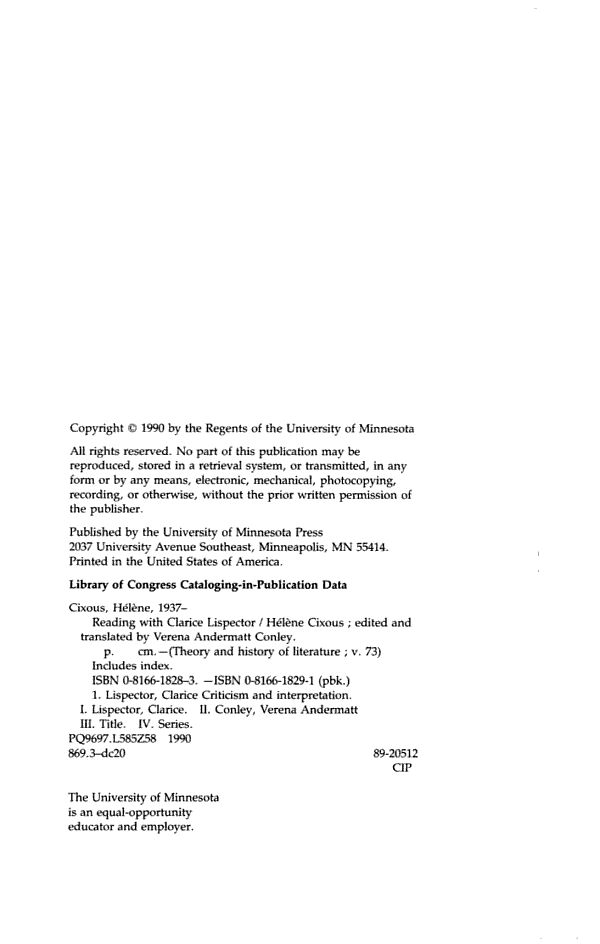
Acknowledgments
I would like to express my gratitude to Iowa State University and James Dow for making the initial stages of this project possible through a summer grant and to Miami University for providing me with a research leave leading to its completion.
My special thanks to Marguerite Sandr for her patient recordings and general help, to writer Mary Howard for her readings of my translations, and to Claudia Guimaraes for helping me with the Portuguese passages.
I would like to thank David, Francine, and my parents for their patience and above all Tom Conley for his continued assistance as well as for his unflinching Irish sense of humor.
My greatest indebtedness is to Helene Cixous, whose readings are the basis of this project.
V.A.C.
Introduction
Verena Andermatt Conley
The pages that follow have been excerpted from Hlne Cixous's ongoing meditations between 1980 and 1985 on problems of reading, writing, difference, and related themes, including exchange and the gift, love and passion, poverty and riches. The texts gathered are all readings of Clarice Lispectoror. rather, readings by Cixous with Lispector in the context of seminars given at the Universit de Paris VIII Vincennes at Saint Denis and at the Collge International de Philosophic. This in part dictates the format of the texts and an ordering reflective of Cixous's preoccupations rather than one that would follow Lispector's chronology as a writer. Cixous discovers Lispector at a time when she studies questions of sexual difference in connection with what have been called libidinal economies, that is, with ways the body is engaged in exchanging with and finding its limits in. a social world.
Paradoxically. Cixous begins her reading of Lispector with one of the Brazilian writer's later texts, Agua viva (The Stream of Life). Cixous claims to have been overwhelmed by her encounter with Agua viva. In it she finds the finest practice of criture fminine. Outside of the seminars, it appears as a somewhat controversial term and has often been misunderstood among literary and social critics. In the relation that Cixous holds with Lispector, criture fminine is a working term referring less to a writing practiced mainly by women than, in a broader logical category, to textual ways of spending. It suggests a writing, based on an encounter with anotherbe it a body, a piece of writing, a social dilemma, a moment of passionthat leads to an undoing of the hierarchies and oppositions that determine the limits of most conscious life. By virtue of its poetry that comes from the rapport of the body to the social world, ecriture fem inine disrupts social practices in the ways it both discerns and literally rewrites them.
For Cixous, in Agua viva Lispector insists on the effacement of the subject, which results in opening on a limitless perspective and undoing the frame of common or representable human experience. Lispector practices what Cixous has been looking for. It is the kind of affinity she feels, the kind of shock she receives at a first reading of Agua viva, that prompts her to take a long detour through much of Lispector's work, some of which is more thematically oriented and marked in its style by existentialism. Lispector's contact with the world is immediate: her language portrays the struggle that human beings engage in with their social milieus and with themselves. Yet the writing does not work through philosophical or dialectical terms that make up the heritage of Simone de Beau, voir or Jean,Paul Sartre. The will to encapsulate that world by writing it is now turned into a far more immediate relation of language and sensation. Cixous accounts for this difference by forging the concept of criture feminine, fraught with the existential and historical position of the female in the world that marginalizes the human subject, but that effectively redeems it through the ways it offers anyone, male or female, a living relation with language and experience.
Lispector's voice transforms Cixous. It comes to her by way of Brazil, in bilingual editions or in French translation. In fact, the work raises questions about the status of readings done from texts in translation, not unlike the problem of American readers of Cixous who face a poetic writing inspired at once by Hegelian philosophy and James Joyce. Phonic and graphic effects, so important for the ideological status of the text, are sometimes changed or even lost in translation. Cixous works through the difference of French and Portuguese, and in turn encounters what her own readers face when they follow her novels (at least from Angst to Limonade). Now Lispector's idiosyncratic use of punctuation is often modified by translators, thus affecting the meaning of the text. A comparison of French and English translations of Lispector for this volume also reveals numerous conceptual discrepancies, often inflecting interpretation and thus further complicating the translator's task. Wherever possible, I opted for the French translation of Lispector for the sake of holding to Cixous's reading as it is articulated in the seminars. All modifications of published English translations have been indicated.
On another level, Cixous's dialogue with Lispector is interspliced with other voices, especially that of Heidegger's essays on poetrysomething already evident in one of the first texts by Cixous on Lispector "Lapproche de Clarice Lispector," in Poetique 10 (October 1979). In no way are Cixous's readings of Lispector the work on a single author, of the type "the author and her work." Rather, they are a theoretical practice of Cixous as a writer whoin her own wordswants to go always farther in her readings (toujours plus loin), in keeping, perhaps, with a highly accessible relation to space and with a psychoanalytic notion of ongoing freeing, conceived as (re)birth or as a subject's perpetual rediscovery of himself or herself.
The chapters in this volume have been transcribed from audiotapes. The oral aspect of the readings has been purposely kept in order to retain the flavor of a style using simple sentences and a certain degree of repetition. A truly didactic type of diction is at work, and its syntax, the obverse of Cixous's other writings, evinces a litanic style, in which a pedagogical discourse is mixed with that of a poet. One of its most recurrent expressions is il y a, or "there is." It implies a theoretical position that refers to Heidegger's es gibt, "there is (to give)," an utterance that is charged with theological and philosophical undertones. It inaugurates an originary moment by calling to attention the positioning of an individual in the world. The words suggest that as a collectivity we have the great grace and privilege of being born into the world through an act of language, simply put, that comes with and is enclosed within all ... there is. Cixous uses the phrase adroitly and rhythmically, but in a style that cannot sustain the same force in written expression. A necessary rephrasing has sometimes made the implicit idea of the gift, which virtually goes without saying in the repetition of // y a, disappear in English. Adequate equivalents for the expression men re en question (to call into question) or // est question de (it is a question of), have been difficult to find. Cixous tries to avoid all statements that tend to closure or to authorize the speaker's mastery over what he or she is stating. Thus put. her observations call questions into question, and undo the speech of a "master's voice." Further, she repeats formulas so as to turn them into elements of oral poetry. For the sake of obtaining variety in the written translation, some of the expressions of questioning have been replaced by declarative sentences.
Font size:
Interval:
Bookmark:
Similar books «Reading with Clarice Lispector»
Look at similar books to Reading with Clarice Lispector. We have selected literature similar in name and meaning in the hope of providing readers with more options to find new, interesting, not yet read works.
Discussion, reviews of the book Reading with Clarice Lispector and just readers' own opinions. Leave your comments, write what you think about the work, its meaning or the main characters. Specify what exactly you liked and what you didn't like, and why you think so.

